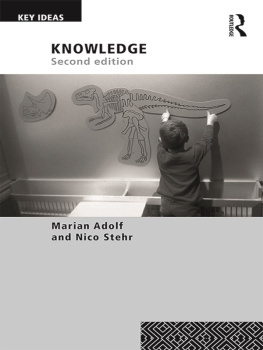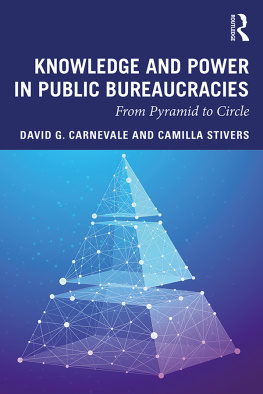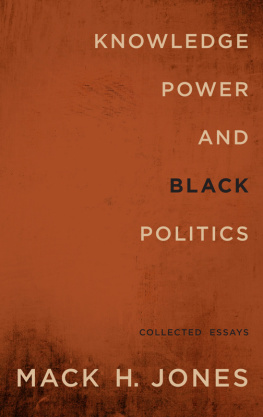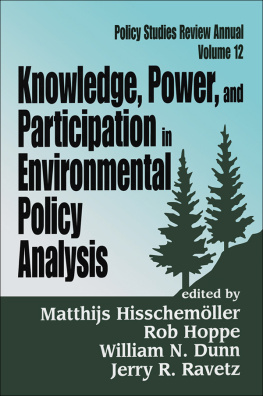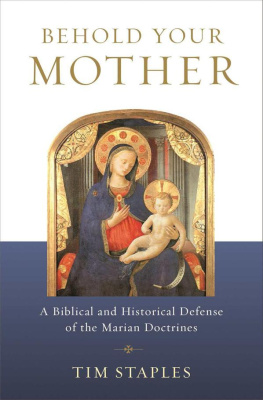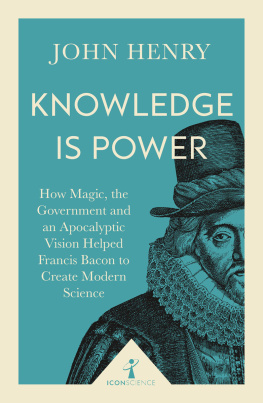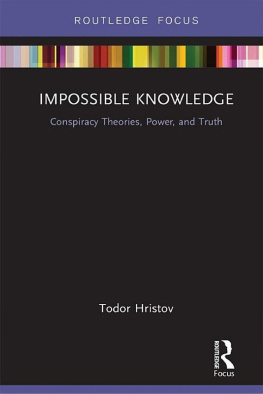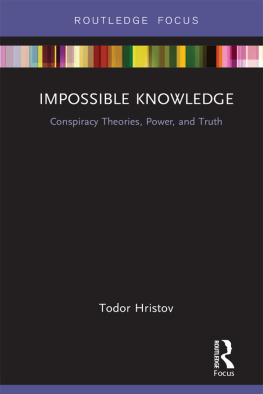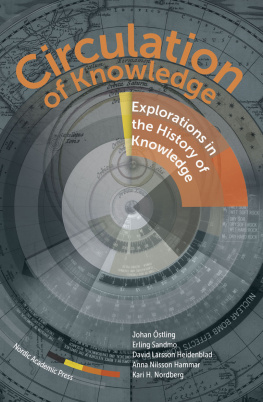Adolf Marian - Knowledge : is knowledge power?
Here you can read online Adolf Marian - Knowledge : is knowledge power? full text of the book (entire story) in english for free. Download pdf and epub, get meaning, cover and reviews about this ebook. year: 2017, publisher: Routledge, genre: Politics. Description of the work, (preface) as well as reviews are available. Best literature library LitArk.com created for fans of good reading and offers a wide selection of genres:
Romance novel
Science fiction
Adventure
Detective
Science
History
Home and family
Prose
Art
Politics
Computer
Non-fiction
Religion
Business
Children
Humor
Choose a favorite category and find really read worthwhile books. Enjoy immersion in the world of imagination, feel the emotions of the characters or learn something new for yourself, make an fascinating discovery.
- Book:Knowledge : is knowledge power?
- Author:
- Publisher:Routledge
- Genre:
- Year:2017
- Rating:5 / 5
- Favourites:Add to favourites
- Your mark:
- 100
- 1
- 2
- 3
- 4
- 5
Knowledge : is knowledge power?: summary, description and annotation
We offer to read an annotation, description, summary or preface (depends on what the author of the book "Knowledge : is knowledge power?" wrote himself). If you haven't found the necessary information about the book — write in the comments, we will try to find it.
Knowledge : is knowledge power? — read online for free the complete book (whole text) full work
Below is the text of the book, divided by pages. System saving the place of the last page read, allows you to conveniently read the book "Knowledge : is knowledge power?" online for free, without having to search again every time where you left off. Put a bookmark, and you can go to the page where you finished reading at any time.
Font size:
Interval:
Bookmark:

As we move through our modern world, the phenomenon we call knowledge is always involved. Whether we talk of know-how, technology, innovation, politics or education, it is the concept of knowledge that ties them all together. However, despite its ubiquity as a modern trope, we seldom encounter knowledge in itself. How is it produced, where does it reside, and who owns it? Is knowledge always beneficial, will we know all there is to know at some point in the future, and does knowledge really equal power? This book pursues an original approach to this concept that seems to define so many aspects of modern societies. It explores the topic from a distinctly sociological perspective, and traces the many ways that knowledge is woven into the very fabric of modern society.
Marian Adolf is Professor of Media Culture at Zeppelin University in Friedrichshafen, Germany. His research interests revolve around the interface of media and social change, communication and cultural theory. He has held appointments as Visiting Professor at Quest University and Alpen-Adria-University Klagenfurt, and currently serves as chair of the German Communication Associations section for Media Sociology.
Nico Stehr is Karl Mannheim Professor of Cultural Studies at Zeppelin University in Friedrichshafen, Germany. He formerly held professorships at the University of Alberta, Edmonton, the University of British Columbia, Ludwig Maximilians University in Munich, and was Paul F. Lazarsfeld Guest Professor at the University of Vienna. He has published widely on the topic of knowledge and is one of the proponents of Knowledge Society, a term that has acquired widespread currency not only in academia.
KEY IDEAS
SERIES EDITOR: PETER HAMILTON
Designed to compliment the successful Key Sociologists, this series covers the main concepts, issues, debates, and controversies in sociology and the social sciences. The series aims to provide authoritative essays on central topics of social science, such as community, power, work, sexuality, inequality, bene fi ts and ideology, class, family, etc. Books adopt a strong 'individual' line, as critical essays rather than literature surveys, offering lively and original treatments of their subject matter. The books will be useful to students and teachers of sociology, political science, economics, psychology, philosophy, and geography.
Culture second edition
Chris Jenks
Human Rights
Anthony Woodiwiss
Childhood second edition
Chris Jenks
Cosmopolitanism
Robert Fine
Nihilism
Bulent Diken
Transnationalism
Steven Vertovec
Sexuality third edition
Jeffrey Weeks
Leisure
Tony Blackshaw
Experts
Nico Stehr and Reiner Grundmann
Happiness
Bent Greve
Risk second edition
Deborah Lupton
Social Identity fourth edition
Richard Jenkins
Renewable Energies
Matthias Gross and Rdiger Mautz
Sustainability
Thomas Pfister, Martin Schweighofer and Andr Reichel
Knowledge second edition
Is knowledge power?
Marian Adolf and Nico Stehr
KNOWLEDGE
Is knowledge power?
Second edition
Marian Adolf and Nico Stehr

Second edition published 2017
by Routledge
2 Park Square, Milton Park, Abingdon, Oxon OX14 4RN
and by Routledge
711 Third Avenue, New York, NY 10017
Routledge is an imprint of the Taylor & Francis Group, an informa business
2017 Marian Adolf and Nico Stehr
The right of Marian Adolf and Nico Stehr to be identified as authors of this work has been asserted by them in accordance with sections 77 and 78 of the Copyright, Designs and Patents Act 1988.
All rights reserved. No part of this book may be reprinted or reproduced or utilised in any form or by any electronic, mechanical, or other means, now known or hereafter invented, including photocopying and recording, or in any information storage or retrieval system, without permission in writing from the publishers.
Trademark notice: Product or corporate names may be trademarks or registered trademarks, and are used only for identification and explanation without intent to infringe.
British Library Cataloguing in Publication Data
A catalogue record for this book is available from the British Library
Library of Congress Cataloging in Publication Data
Names: Adolf, Marian, author. | Stehr, Nico, author.
Title: Knowledge : is knowledge power? / by Marian Adolf and Nico Stehr.
Description: Abingdon, Oxon ; New York, NY : Routledge, 2016. | Includes bibliographical references and index.
Identifiers: LCCN 2016009864| ISBN 9781138685673 (hardback) | ISBN 9781138685680 (pbk.) | ISBN 9781315543093 (ebook)
Subjects: LCSH: Knowledge, Sociology of.
Classification: LCC HM651 .A26 2016 | DDC 306.4/2dc23
LC record available at https://lccn.loc.gov/2016009864
ISBN: 978-1-138-68567-3 (hbk)
ISBN: 978-1-138-68568-0 (pbk)
ISBN: 978-1-315-54309-3 (ebk)
Dedicated to all we love.
In our conception and exploration of knowledge about knowledge, its social role as a capacity to act, its various forms and carriers, and the social division of knowledge in modern societies we have taken cues from a variety of our previous work, both taken on board and elaborated. Relevant discussions, in which especially Nico Stehr was involved, now range over a period of more than four decades. The theoretical and empirical work on the social role of knowledge is reflected in a series of monographs, anthologies and journal articles including our earlier volume on Knowledge (Adolf and Stehr, 2014). Many of these past efforts were published in German. References to these initial publications can be found in the relevant sections of the text and, of course, in our bibliography.
What unites these works on the societal role of knowledge is a sociological concept of knowledge. Our discussion, therefore, is not pri-marily based on the post-positivist unease, increasing since the 1960s, towards a positivist philosophy of science that is constrained by a narrow understanding of the scientific method. Undoubtedly, the cri-tique of positivism has brought forth perspectives that also play a part in the sociological study of knowledge. These include, for example, the concepts of tacit knowledge and situation-specific knowledge or the notion of bounded rationality. On the other hand, the sociology of knowledge has contributed a valuable extension to modern philosophy of science.
The discourse on the concept of knowledge and the societal function of knowledge were initially explored in a comprehensive manner in the study Knowledge Societies (Stehr, 1994). The preceding publication, dating from 1986, by Gernot Bhme and Nico Stehr on the theory of modern society as a knowledge society turned out to be one of the publications that substantially co-determined the research field of knowledge and contemporary social relations (Bhme and Stehr, 1986).
In the meantime, the issue of the social role of knowledge has on various occasions been repeatedly taken up, often in collaboration with Marian Adolf. Fundamental questions such as the cultural foundations of innovation and the role of the media in the knowledge society have been examined together, as well as current societal developments and problems such as, for example, the importance of moral convictions for modern markets or the consequences of the digital media revolution and the re-assertion of social physics.
Font size:
Interval:
Bookmark:
Similar books «Knowledge : is knowledge power?»
Look at similar books to Knowledge : is knowledge power?. We have selected literature similar in name and meaning in the hope of providing readers with more options to find new, interesting, not yet read works.
Discussion, reviews of the book Knowledge : is knowledge power? and just readers' own opinions. Leave your comments, write what you think about the work, its meaning or the main characters. Specify what exactly you liked and what you didn't like, and why you think so.

